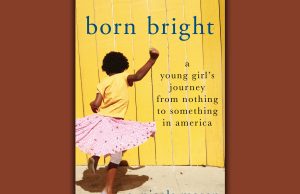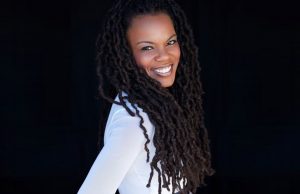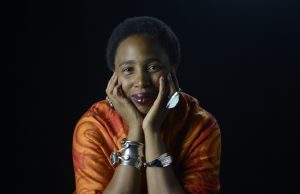The Making of a Bad Ass Black Feminist: A Conversation with C. Nicole Mason and Aishah Shahidah Simmons
 Writing can be a transgressive and political act. At its best, a well-crafted and finely told story can point the reader in the direction of her healing, her power and her connection to the world and others.
Writing can be a transgressive and political act. At its best, a well-crafted and finely told story can point the reader in the direction of her healing, her power and her connection to the world and others.
In this interview with C. Nicole Mason, author of Born Bright: A Young Girl’s Journey from Nothing to Something In America (St. Martin’s Press, August 16, 2016) and Aishah Shahidah Simmons, an associate editor of The Feminist Wire and the producer/writer/director of the critically acclaimed film NO! The Rape Documentary, these long-time friends talk writing to transgress, simultaneously holding Black pain and joy, and just how a Bad Ass Black Feminist gets made.
The two met at Café Rue Dix, a French-Senegalese restaurant in Crown Heights, Brooklyn.
Aishah: Nicole, first let me share that Born Bright is such a captivating and triumphant memoir. And congratulations, it has received so much well-deserved advance praise.
I was pulled in from the very first page where you introduce us to little Nicole and talk about removing the middle class mask to tell your story, your truth. And you did. You left no stone unturned in your masterful retelling of the first eighteen years of your life. I was on an emotional roller coaster. It was a real tear jerker. I could not put it down until I was finished reading.
One of many things I love about Born Bright is that it’s not the egregiously painful “Pull yourself up from your bootstraps” narrative that has particular currency in today’s literary marketplace. It is a story that has become all too familiar when we talk about the experiences of Black and Brown people in America.
In the book, you place your experiences at the center of the narrative and use them to challenge the racist, sexist and classist beliefs that poor and working class Blacks are impoverished because of bad choices or intergenerational pathologies such as out of wedlock births, crime and high rates of single motherhood. Instead, you place the onus and responsibility on systems and institutions—the criminal-legal, education, and social welfare system– that maintain and perpetuate the vicious, cycle of racialized and gendered poverty in America.
Thank you for you this incredible gift, particularly in our current social and political moment.
Let’s get started. Why did you write Born Bright and what is the significance of you writing it in this political moment and time?
Nicole: There’s no doubt that we are living in bloody and tumultuous times—from Ferguson to Baltimore to Chicago, and many other cities across the country, Black bodies and lives are under attack. What we are witnessing is the backlash and resistance to progress. However, I am not fearful, because historically, forward movement and gains have always been met with resistance in the form of bloodshed and in many instances death.
I wrote Born Bright because I believed I had something to say and contribute to the conversation about the experiences of Black girls, women and communities in America. The stories we are told about Black women and girls in dominant media and culture are not reflective of our lived experiences and of who we are. They are caricatures or distortions. In my own way, I am attempting to right the record. Born Bright is my song for Black girls.
Aishah: How has being a Black Feminist influenced your writing and your work?
Nicole: This is a good question. As a Black Feminist, I know writing is a political act. Every word, every sentence is intentional and has meaning. While a student at Howard, I devoured the writings of Zora Neale Hurston, Audre Lorde, Alice Walker, Beverly Guy Sheftall, Joyce Ladner, bell hooks and Angela Davis—they were my first teachers. And before that, I sat at the feet of Toni Morrison (not literally), learning how to read and tell stories through the eyes of Black women. These Bad Ass Black Feminists writers and activists made me. Without them, there would be no Born Bright. Seriously.
Aishah: In your opinion, what’s the significance of being a Black woman writer and memoirist?
Nicole: In general, I think that it’s rare for a Black woman, woman of color, to be both the subject and the storyteller. We are either one or the other, but never both. Next to black men and white women, our stories are often treated as secondary or tertiary. In Born Bright, the Black girl and woman experience is primary and the lens out of which the reader is asked to view the world—How fucking amazing is that?
Aishah: It is so amazing and very, very timely, Nicole. Born Bright is a powerful part of an incredible continuum of those too few and far between Black women authors, from enslavement to present day, who place Black girl’s and women’s stories at the center of their narratives.
Nicole: I also think writing a memoir is different from writing fiction—the people and the interactions are real—you can’t pretend that the story is happening out there, in some fantasy, fictitious world. You must grapple with the grittiness, and the pain and meaning of the experiences and know that they happened to a person or a group of people that may be living.
Aishah: You’ve been doing research and organizing around Black women and girls for nearly two decades, how does Born Bright align with that work?
Nicole: Yes, and I believe we have known each other for nearly as long. I began my organizing work at Howard University. There, I founded the first feminist organization on campus–the Women’s Action Coalition. And while I had some supporters, there was a lot of open hostility and resistance to feminism and organizing around issues of violence against women, reproductive justice and poverty.
I spent a lot of time (a waste of time) debating whether talking about gender was a distraction from issues of race. In one of my classes, I remember another student calling me a “real live feminist,” like I was an alien or something.
Around that same time, I began volunteering at a local battered women’s shelter where I met a group of radical queer, unapologetic feminists. Those two experiences changed my life.
For the first time, I had language for my experiences growing up as a Black girl and for the experiences of my mom, my aunts, my cousins and the many other girls that I had known or grown up with. It was then, that I decided that this–organizing, writing about, researching, documenting, and lifting up–the experiences of Black women and girls would be my life’s work. Born Bright is an extension of this commitment.
Aishah: I remember those days, Nicole. That’s when our activist paths crossed and interlocked at the intersections of radical queer, race and gender theories and practice. You’re right. Born Bright is definitely an extension of your commitment to women and girls of color.
Recently, there have been several memoirs written by Black men around the same time period— Ta-Nehisi Coates, Kevin Powell, D. Watkins, and Mychal Denzel Smith, but I believe Born Bright is one of the first memoirs by a Black woman released by a major publishing house since Margo Jefferson’s award-winning Negroland: A Memoir in 2015. What do you make of that?
Nicole: I love the brothers, I truly do, and their stories need to be told, no doubt. However, I do not believe we have nearly enough memoirs or stories written by Black women where our experiences and analyses are central. It’s the truth. When I think about memoirs written by Black women that have received national attention or acclaim—I think about Maya Angelou’s I know why the Caged Bird Sings, bell hooks’ Bone Black, Elaine Brown’s A Taste of Power, Staceyann Chin’s The Other Side of Paradise, the recently a few others. However, they are too few and far between.
What I’m hoping is that Born Bright will open the doors for many other women to tell their stories in a public way. My story is only one of the many stories that need to be told—there are so many others. I do not claim to be representative or have the definitive Black girl story. That would be wrong and misleading.
Aishah: We live in a time where Black trauma is everywhere and on display. It is true upheaval and bloodshed. What appreciate about Born Bright is that you are able to simultaneously hold both black joy and pain without conflict. Can you talk about more about this?
Nicole: Anyone who knows me knows that I thrive in the space that is not continuous, neat or without its own contradictions. Yes, it’s true I’ve experienced tremendous amounts of pain, but I’ve also experienced copious amounts of joy and happiness in my life. And I wanted to write as though that was not only true for me, but for others as well.
In the book, I attempt to tell the story without judging the behavior or choices of the people I wrote about, including myself. I also enjoyed writing about the sharp edges, the darkness as well as the light.
Aishah: What was the hardest thing to write or talk about in the book?
Nicole: First of all, I cried nearly everyday writing the book. It was hard as shit—the memories, the flashes of anger that crept in as I wrote, and trying to understand the actions and behavior of the people in my life through their eyes. I had no idea that it would be as difficult as it was.
For sure, the most difficult person and experience to write about was my mother and our relationship. It is a relationship that has troubled me in some shape or form for most of my life. She is beautiful and complicated, with very sharp edges. Her love was delayed and never spoken. It was a utilitarian love. It was also fleeting. Writing the book, I gained a deeper understand of her life because I had to see things from her perspective and give voice to her struggles.
For years, I kept tally of the many ways I was different from her. I told myself were nothing alike. However, after writing the book, I realized that I am without a doubt my mother’s daughter.
Aishah: There’s one line in the book where you say—“It was still hell…so I decided to save myself.” Such a powerful line that will resonate with many. I know it resonated with me deeply. Can you talk about what that means and the larger significance of that line to Black women and girls?
Nicole: In many ways, I did save myself. And I think many Black women and girls have had to do the same, out of necessity and survival. For a long time, I was always waiting to be saved—by God, by the Church, by a teacher or whomever I thought was coming to rescue me, but they never came. And the knowing that comes from having to save one’s self is what I wrap myself in during difficult times or when my knuckles are bare.
Aishah: Who are some of your favorite writers?
Nicole: Right now, I am loving Claudia Rankine. Her writing is crisp, truthful and reflective of the Black experience in America. I am also feeling Ingrid Burley, the woman who wrote Love Drought on Beyoncé’s latest album Lemonade. She is brilliant and her writing is emotional, capturing life in its most vulnerable moments.
I am also a sucker for legal scholars and writers. My faves are Dorothy Roberts author of Killing the Black Body and Ian Haney Lopez, author of Dog Whistle Politics.
Aishah: What is your hope for Born Bright?
Nicole: I hope readers enjoy the story and go on the journey with this little girl who is trying to make sense of her world. I hope that readers see themselves in her.
I also want readers to be curious about the journey of the person sitting across from them on the subway, in the classroom or in their office. It will humanize us all and shift how we relate to one another.
Aishah: In closing, I want to celebrate that Born Bright is a heartrending praise song in honor of countless Black girls across the United States, who, because of their race, their gender, and their socio economics are severely marginalized and grossly disenfranchised in a myriad of ways. I will gift it to many and I will definitely teach it. I encourage everyone to either pick up or order a copy today.
 C. Nicole Mason, PhD is Executive Director of the Center for Research and Policy in the Public Interest at the New York Women’s Foundation. Prior to her position at CR2PI, Mason was the most recent Executive Director of the Women of Color Policy Network at New York University’s Robert F. Wagner Graduate School of Public Service. She held the distinction of being one of the youngest scholar-practitioners to lead a major U.S. research center or think tank. She is also an Ascend Fellow at the Aspen Institute in Washington, DC. She has written hundreds of articles on women, leadership development and economic security. Her writing and commentary have been featured in MSNBC, CNN, NBC, CBS, Real Clear Politics, the Nation, Marie Claire Magazine, the Washington Post, the Progressive, ESSENCE Magazine, the Root, the Grio, the Miami Herald, Democracy Now, and numerous NPR affiliates, among others. You can follow Nicole on Twitter @cnicolemason and connect on her Public Facebook Page.
C. Nicole Mason, PhD is Executive Director of the Center for Research and Policy in the Public Interest at the New York Women’s Foundation. Prior to her position at CR2PI, Mason was the most recent Executive Director of the Women of Color Policy Network at New York University’s Robert F. Wagner Graduate School of Public Service. She held the distinction of being one of the youngest scholar-practitioners to lead a major U.S. research center or think tank. She is also an Ascend Fellow at the Aspen Institute in Washington, DC. She has written hundreds of articles on women, leadership development and economic security. Her writing and commentary have been featured in MSNBC, CNN, NBC, CBS, Real Clear Politics, the Nation, Marie Claire Magazine, the Washington Post, the Progressive, ESSENCE Magazine, the Root, the Grio, the Miami Herald, Democracy Now, and numerous NPR affiliates, among others. You can follow Nicole on Twitter @cnicolemason and connect on her Public Facebook Page.
Award-winning Black feminist lesbian cultural worker Aishah Shahidah Simmons is an Associate Editor of The Feminist Wire and a 2016-2018 Just Beginnings Collaborative Fellow. An incest and rape survivor, she is developing her multimedia project #LoveWITHAccountability, which will examine how accountability is a radical form of love needed to end child sexual abuse. Aishah has screened her work, guest lectured, and facilitated workshops and dialogues throughout North America, across Europe and in countries in Africa, Asia, and the Caribbean. You can follow Aishah on Twitter at @AfroLez and #LoveWITHAccountability at @LoveAccountably.





0 comments